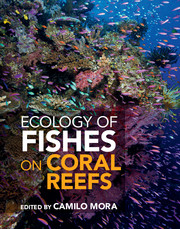Book contents
- Frontmatter
- Contents
- Preface
- Foreword
- List of contributors
- PART I BASIC ECOLOGY
- PART II PATTERNS AND PROCESSES
- PART III HUMAN FINGERPRINTS
- 13 Effects of climate change on coral reef fishes
- 14 Effects of fishing on the fishes and habitat of coral reefs
- 15 Effects of sedimentation, eutrophication, and chemical pollution on coral reef fishes
- 16 Impacts of invasive species on coral reef fishes
- 17 Cashing in on coral reefs: the implications of exporting reef fishes
- PART IV CONSERVATION
- PART V DEBATES AND PARADIGM SHIFTS
- References
- Index
15 - Effects of sedimentation, eutrophication, and chemical pollution on coral reef fishes
from PART III - HUMAN FINGERPRINTS
Published online by Cambridge University Press: 05 May 2015
- Frontmatter
- Contents
- Preface
- Foreword
- List of contributors
- PART I BASIC ECOLOGY
- PART II PATTERNS AND PROCESSES
- PART III HUMAN FINGERPRINTS
- 13 Effects of climate change on coral reef fishes
- 14 Effects of fishing on the fishes and habitat of coral reefs
- 15 Effects of sedimentation, eutrophication, and chemical pollution on coral reef fishes
- 16 Impacts of invasive species on coral reef fishes
- 17 Cashing in on coral reefs: the implications of exporting reef fishes
- PART IV CONSERVATION
- PART V DEBATES AND PARADIGM SHIFTS
- References
- Index
Summary
Increasing exposure to sediment, nutrients, and chemical pollutants are threatening an estimated 25% of the world's coral reefs. This chapter reviews the direct and indirect effects of these three forms of marine pollution on the behavior, physiology, life histories, and communities of coral reef fishes, and the potential consequences of altered fish abundances for the ecology of coral reefs. Increased sediment, both in suspension and settled, can directly affect reef fishes by reducing visual and chemical cues, disrupting the feeding of planktivores and herbivores, and altering predator–prey interactions. Sublethal effects on physiological performance, including gill damage, impaired osmoregulation, and larval development may also have long-term ecological consequences for coral reef fish communities. Increased sediment and nutrient loads can also lead to algal blooms and the proliferation of macroalgae, exposing coral reef fishes to hypoxia, toxins, and degrading habitat quality. Pesticides, heavy metals, and other chemical contaminants can accumulate in coral reef fishes, with as yet unknown ecological consequences. Finally, pharmaceuticals and personal care products can act as endocrine disrupters and alter behavior, and can be vectors for antibiotic-resistant bacteria. The documented effects of pollution on reef fishes suggest the potential for feedback loops, with altered fish behavior and abundances detrimentally affecting reef health. Given the rapid spread of coastal pollution, field studies on their multifaceted effects on ecological processes in coral reefs deserve a high priority.
Coral reefs are increasingly subject to the effects of sedimentation, eutrophication, and chemical pollution [717, 783, 2493]. Currently, 275 million people worldwide reside within 30 km of coral reefs [380]. Some of the greatest increases in population density and coastal development are occurring in emerging tropical economies, including those in the Coral Triangle – the global biodiversity hotspot for coral reef ecosystems [1138]. The main types of pollutants delivered into coral reefs are sediments, nutrients, pesticides (herbicides and insecticides), heavy metals, and industrial and pharmaceutical contaminants [346,380].
- Type
- Chapter
- Information
- Ecology of Fishes on Coral Reefs , pp. 145 - 153Publisher: Cambridge University PressPrint publication year: 2015
- 32
- Cited by



